Pony.ai Officially Lists on Nasdaq: The First Robotaxi IPO, Marking a 'Milestone' for Autonomous Driving in China
![]() 11/28 2024
11/28 2024
![]() 586
586
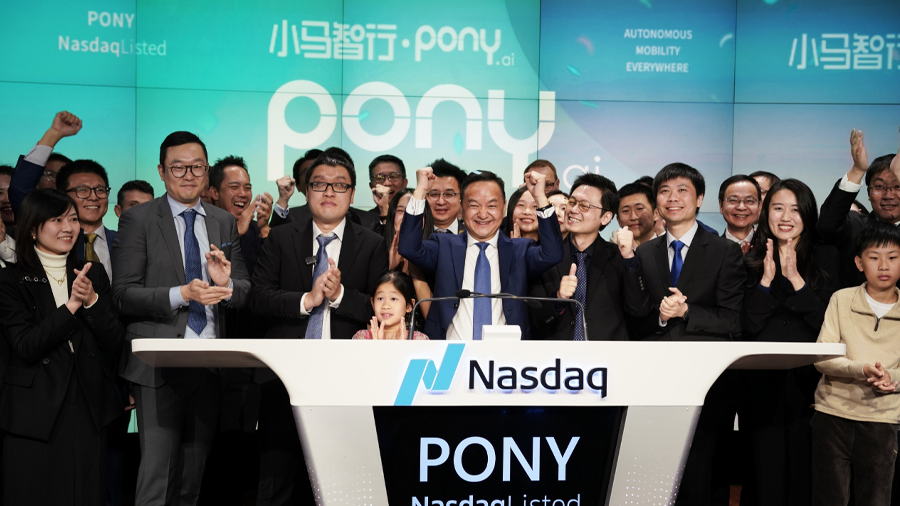
The 'First Global Robotaxi IPO' in the truest sense.
Original article by IPO Zaozhidao | Author: Stone Jin | WeChat public account: ipozaozhidao According to IPO Zaozhidao, Pony.ai officially listed on Nasdaq on the evening of November 27, 2024, Beijing time, with the stock ticker 'PONY', becoming the 'First Global Robotaxi IPO'.
Pony.ai issued a total of 20 million ADS in this IPO at a price of $13 per share, which is at the top of the proposed issuance range. Among them, BAIC Group and Singaporean transportation operator ComfortDelGro participated in Pony.ai's IPO as cornerstone investors; simultaneously, Pony.ai also conducted a strategic private placement of approximately $153.4 million, with multiple investors, including GAC Capital, a wholly-owned subsidiary of GAC Group, participating in the private placement. That is, if the 'greenshoe option' is exercised, the total fundraising size of Pony.ai's IPO will be up to approximately $452 million.
In fact, given the unprecedented surge in investor enthusiasm for Pony.ai's IPO subscription, Pony.ai expanded the IPO size during the issuance process. Additionally, IPO Zaozhidao learned from investment banking professionals close to Pony.ai's IPO that the company achieved oversubscription after the IPO prospectus was launched. Besides the publicly disclosed BAIC Group and ComfortDelGro, the participating institutions also included multiple existing shareholders of Pony.ai and several top international investment institutions.
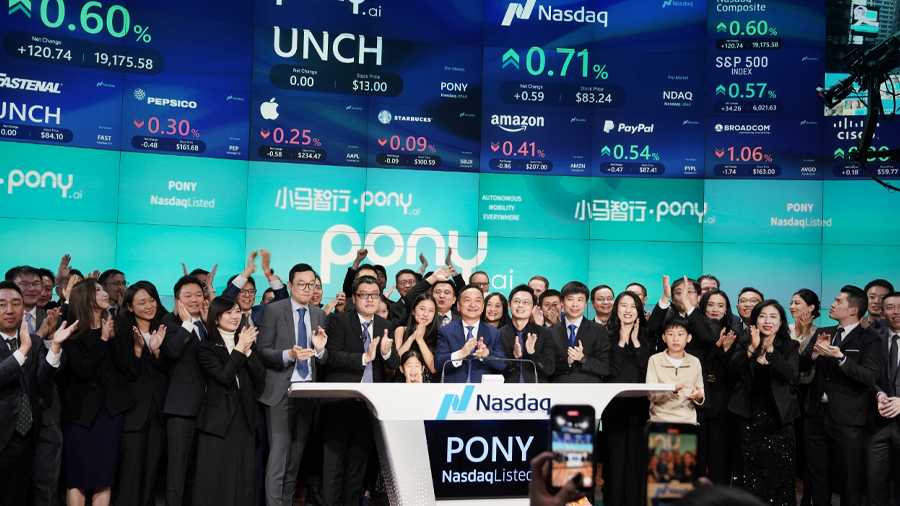
Pony.ai's listing on Nasdaq today can be seen as a 'milestone' for autonomous driving in China to some extent and is also expected to become the largest autonomous driving IPO in the U.S. stock market this year.
Pony.ai's co-founder and CEO, Peng Jun, expressed pride in leading the company to Nasdaq and said, 'Since its establishment in 2016, Pony.ai has become a global leader in the large-scale commercialization and mass production of autonomous driving, thanks to the support of every user, partner, shareholder, and employee. Over the past eight years, Pony.ai has led the industry through cycles and made unremitting breakthroughs for technological change, finally ushering in a crucial inflection point for commercialization. The dawn of autonomous driving is upon us. We start with the end in mind and will create a safer, more efficient, and convenient future transportation for society.'
Pony.ai's co-founder and CTO, Lou Tiancheng, said, 'Listing on Nasdaq is just the beginning of autonomous driving technology changing the world, and our journey is far from over. The path to breakthroughs in autonomous driving is like climbing Mount Everest, and we have chosen perseverance, patience, and long-termism to achieve a qualitative technological leap beyond human drivers. From today onwards, Pony.ai's belief will take root worldwide – AI can not only provide safer and more efficient services but also bring unprecedented experiences, completely revolutionizing human understanding of driving.'

Dubbed the 'Chinese Version of Waymo,' Pony.ai is truly the 'First Global Robotaxi IPO'
Founded in 2016, Pony.ai primarily provides autonomous driving technologies and solutions for the mobility and logistics sectors in the global market, developing 'Virtual Driver' technology applicable to different vehicle models and application scenarios. Based on this, Pony.ai's revenue also primarily comes from autonomous mobility services (Robotaxi), autonomous trucks (Robotruck), and technology licensing and application services. Currently, Pony.ai's total autonomous driving road test mileage has reached nearly 40 million kilometers.
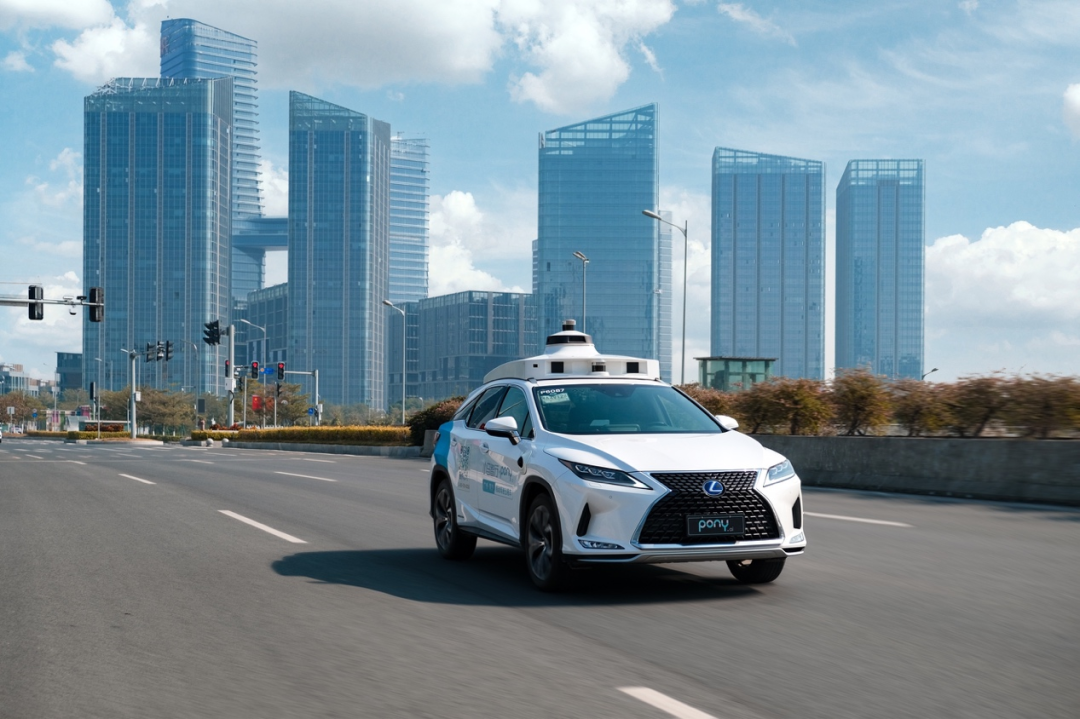
In December 2018, Pony.ai launched PonyPilot, China's first autonomous mobility service (Robotaxi), and became one of the very few companies globally to achieve fully autonomous driving, truly leading the mass production and commercialization of global Robotaxi. According to Frost & Sullivan's report, Pony.ai is one of the first domestic enterprises to obtain Robotaxi service licenses in Beijing, Shanghai, Guangzhou, and Shenzhen and the only autonomous driving technology company to obtain all available regulatory licenses in these four first-tier cities.
To date, Pony.ai has deployed over 250 Robotaxis nationwide and has started fully autonomous commercial charging for Robotaxis in Beijing, Guangzhou, and Shenzhen. Its Robotaxis have accumulated over 33.5 million kilometers of autonomous driving road test mileage, including over 3.9 million kilometers of driverless road test mileage. As of June 30, 2024, the number of registered users of the PonyPilot mobile app exceeded 220,000; by the end of August 2024, approximately 70% of registered users had used Pony.ai's services multiple times. Additionally, Pony.ai has integrated with third-party ride-hailing platforms such as Amap, Alipay, and Ruqi Chuxing. As of June 30, 2024, the average daily order volume per fully autonomous Pony.ai Robotaxi exceeded 15.
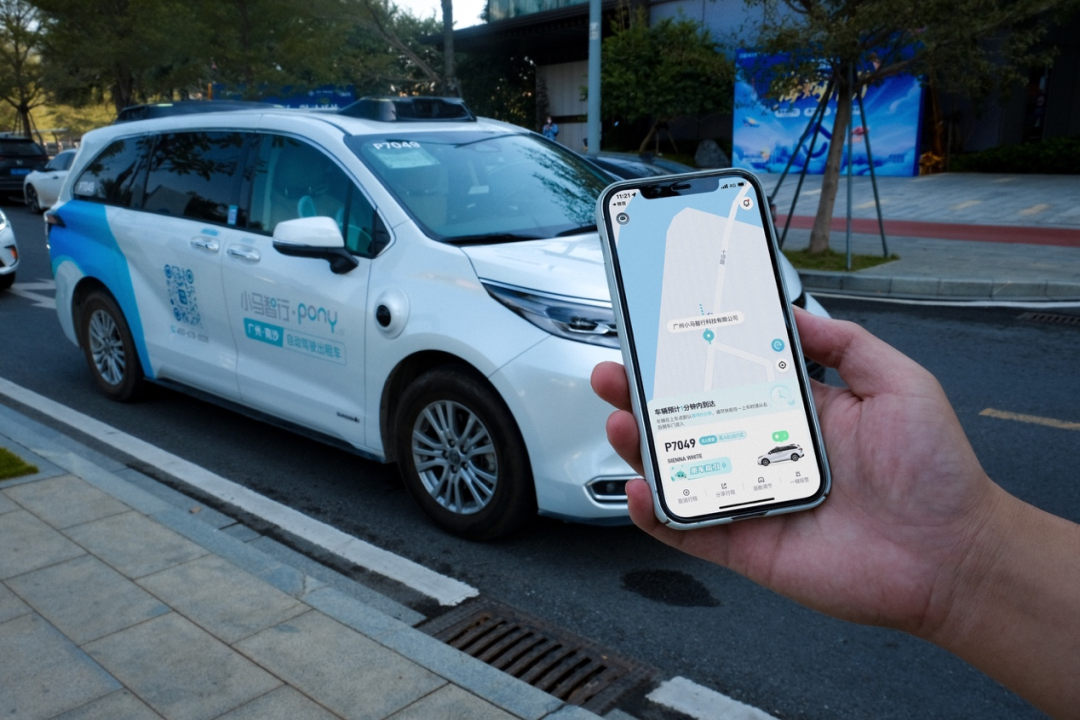
Notably, Pony.ai expects its Robotaxi business to achieve positive gross profit per vehicle in 2025, partly due to its continuous efforts in the mass production of Robotaxis. In August 2019, Pony.ai officially announced a strategic partnership with Toyota to begin developing the first Robotaxi model. In April this year, Pony.ai, Toyota China, and GAC Toyota established a joint venture with an investment exceeding RMB 1 billion to jointly promote the mass production and service implementation of autonomous taxis. Currently, the joint venture is conducting joint research and development and production planning for the first Botaxi 4X model and has started production preparations, with plans to deploy over 1,000 Robotaxis in first-tier cities from 2025 to 2026. On November 2, Pony.ai officially reached a comprehensive cooperation agreement with BAIC BJEV. Both parties will cooperate to develop fully autonomous Robotaxi models based on the ARCFOX Alpha T5 model and Pony.ai's seventh-generation autonomous driving software and hardware system solution, aiming to form an operational capacity of 1,000 units as soon as possible.
In addition to the domestic market, Pony.ai is also promoting the export of autonomous driving technology solutions and products to Europe, the Middle East, Asia, and other regions. Notably, ComfortDelGro, which participated in the IPO subscription, is an important partner for Pony.ai in advancing its global Robotaxi strategy, with a business covering 12 countries and an operating network of over 29,000 taxis globally. In July this year, both parties signed a memorandum of cooperation to jointly promote the commercialization of driverless taxis in China and other countries and regions.
To date, Pony.ai has the largest number of online car-hailing and taxi platform partners among global Robotaxi companies, covering platforms such as Ruqi Chuxing, Alipay, Amap, Jinjiang Taxi, Singapore's ComfortDelGro Group, and Luxembourg's travel company Emile Weber. The scale and number far exceed those of the industry, paving the way for the large-scale deployment of Robotaxi fleets and services and building a market and user base. 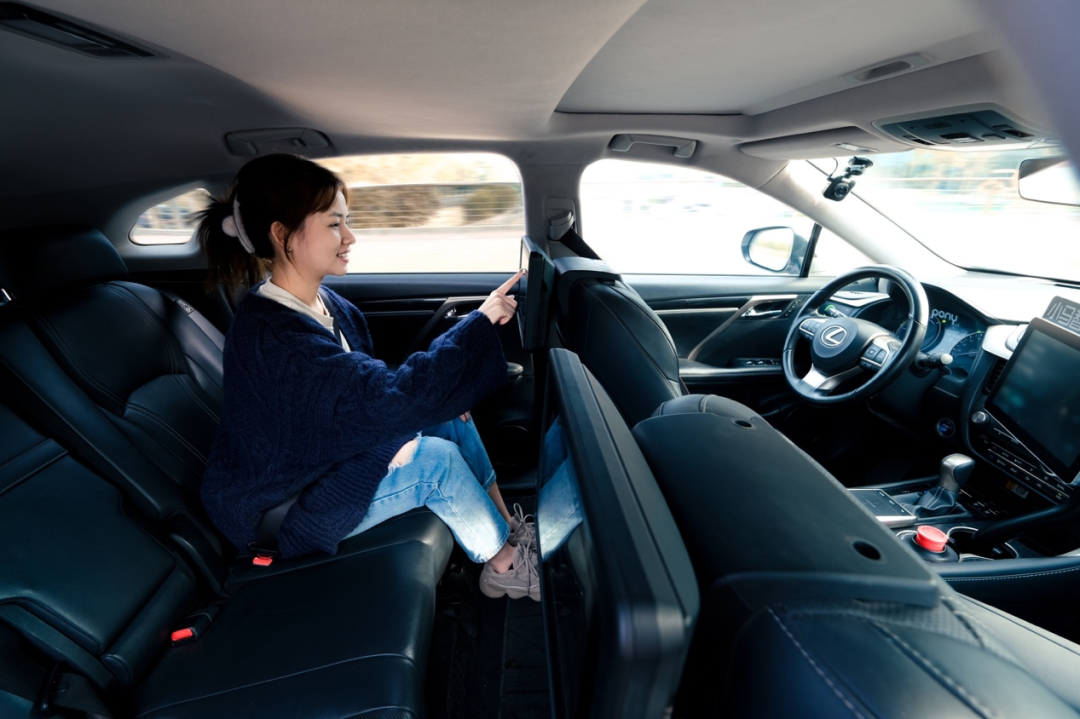
It is important to emphasize that simply obtaining a license or completing a test ride does not qualify a company as a Robotaxi company. Currently, there are only three companies globally that can truly achieve normalized operations of fully autonomous driving: Waymo, Pony.ai, and Baidu.
Let's briefly compare Pony.ai with Waymo. In terms of establishment, the former was founded in 2016, while the latter originated from Google's self-driving car project in 2009. However, both began offering Robotaxi services in 2018 and later launched fully autonomous commercial Robotaxi services with a fleet of over 100 vehicles. From a technical standpoint, Lou Tiancheng shared Pony's World Model in September this year, while Waymo officially announced its next-generation AI model, the 'Waymo Foundation Model,' at the end of October. Both have taken a solid step from catching up with humans to surpassing them. In terms of coverage scenarios, both prioritize high-commercial-value cities and urban travel scenarios, including airports, city centers, and high-speed rail stations (unique to Pony.ai). Regarding specific solutions, both adopt multi-sensor fusion for perception, with Pony.ai using automotive-grade sensors and significantly reduced computational chip costs, achieving world-leading performance at a lower cost.
It is not difficult to see that Pony.ai's business model is highly similar to Waymo's and can be regarded as the 'Chinese Version of Waymo' to some extent. Furthermore, based on its substantial Robotaxi business, Pony.ai is truly the 'First Global Robotaxi IPO' in the truest sense. 
Able to 'dream big' while efficiently advancing commercialization, the sector has strong growth potential, and Pony.ai offers high investment value
It is undeniable that L4 autonomous driving poses significant challenges due to its complexity, high investment, and distant practical application. It is a technological peak that humans have yet to reach, and persisting in this field is extremely difficult. Today, only a handful of companies globally are truly pursuing L4 and achieving fully autonomous commercialization.
From another perspective, L4 autonomous driving represents the original aspiration and determination of co-founders Peng Jun and Lou Tiancheng. Over the past eight years, Pony.ai has weathered ups and downs but has always adhered to the technological development and strategic prospects of Robotaxi, never wavering. In particular, these two 'technological geniuses' can not only dream big but also continuously advance Pony.ai's commercialization process.
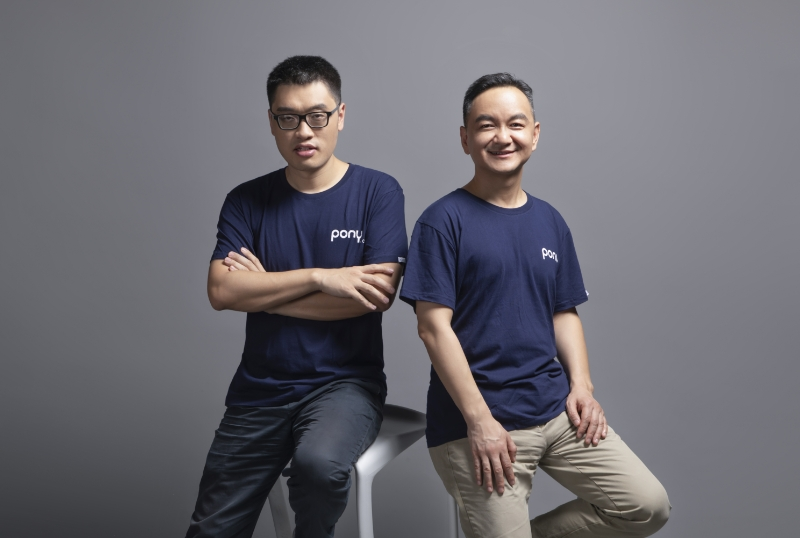
Right: Peng Jun; Left: Lou Tiancheng
On the one hand, both Peng Jun and Lou Tiancheng have profound technical expertise, having cultivated the autonomous driving and artificial intelligence fields from scratch. Among them, co-founder and CEO Peng Jun served as the chief architect of Baidu's autonomous driving business before founding Pony.ai, responsible for autonomous driving technology research and development. Earlier, he worked at Google for seven years and received the Google Founders Award. Co-founder and CTO Lou Tiancheng is a world-renowned computer programmer known in the programming community by his competition ID 'ACRush.' He won the TopCoder China championship for 11 consecutive years and the Google Code Jam championship twice. Before founding Pony.ai, Lou Tiancheng worked on driverless vehicle technology development at Google X (Waymo) and later served as the technical committee chairman of Baidu's Autonomous Driving Business Unit, becoming the youngest T10-level engineer in history.
On the other hand, in terms of performance, Pony.ai's revenues were $68.39 million and $71.9 million in 2022 and 2023, respectively. In the first three quarters of this year, Pony.ai's revenue was $39.51 million, a year-on-year increase of 85.5%, with a total revenue of over $179 million (approximately RMB 1.3 billion) in the past three years.
In terms of revenue composition, Pony.ai's three core revenue sources all showed year-on-year growth in the first three quarters of this year. Specifically, autonomous mobility service revenue was $4.7 million, a year-on-year increase of 422.2%; autonomous freight service revenue was $27.4 million, a year-on-year increase of 56.5%; and technology licensing and application service revenue was $7.4 million, a year-on-year increase of 155.2%. The primary reason for the increase in autonomous mobility service revenue was income from the Korean Robotaxi technology solution project, with a small portion attributable to the expansion of Robotaxi services in first-tier cities and increased passenger payments. This suggests that as the commercial deployment of autonomous mobility services accelerates, Pony.ai anticipates continued growth in this revenue both in absolute terms and as a proportion of total revenue.
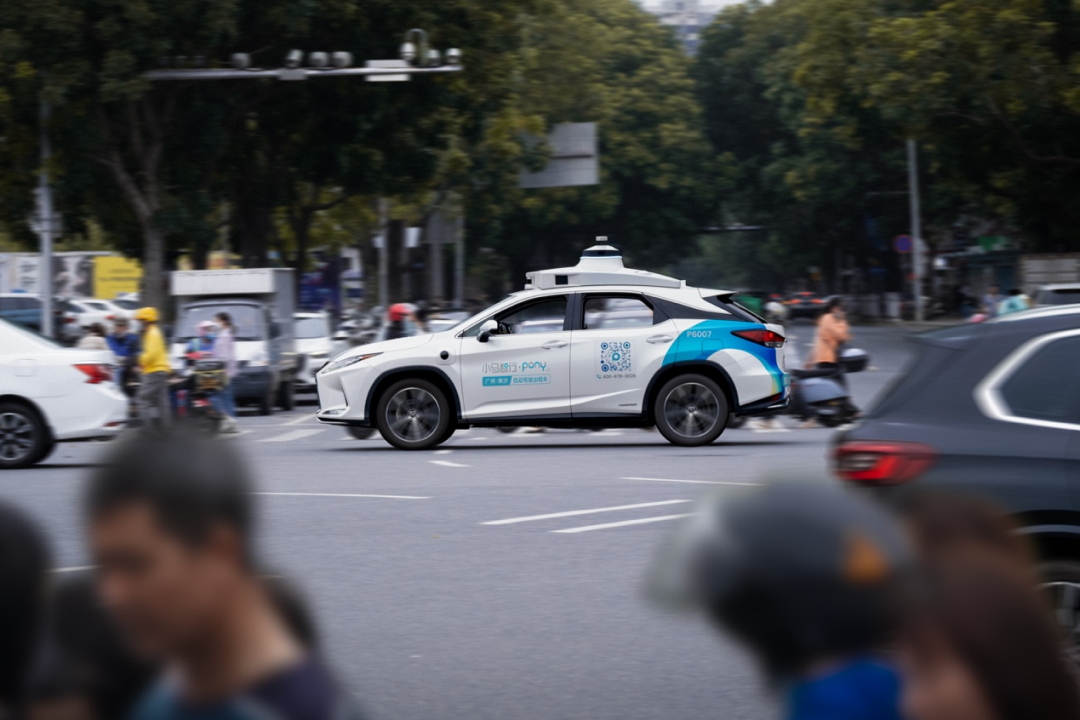
While revenue continues to grow, Pony.ai's operational efficiency is also improving. From 2022 to 2023, Pony.ai's net losses were $148 million and $125 million, respectively. In the first half of this year, Pony.ai's net loss was $51.78 million, a year-on-year narrowing of 25.6%. Notably, both Pony.ai's research and development expenses and selling, general, and administrative expenses showed a downward trend.
The decrease in research and development expenses is primarily due to accelerated commercial monetization. Many R&D employees involved in commercial revenue-generating projects have had their compensation expenses reclassified into operating costs rather than research and development expenses. From 2022 to 2023, research and development expenses decreased from $153.6 million to $122.7 million, a year-on-year decrease of 20.1%. Pony.ai explained in its prospectus that the decrease in research and development expenses in 2023 was primarily due to reduced employee compensation expenses. As the company's revenue projects and scale increased, part of the compensation expenses for R&D personnel were reclassified into cost of revenue, while a small portion of the reduced compensation expenses was offset by increased development and testing expenses. This indicates that technological investments are being commercialized. The decrease in research and development expenses in the first half of 2024 was mainly due to reduced equipment depreciation and amortization expenses and decreased expenses for more focused marketing activities. The decrease in selling, general, and administrative expenses was the result of cost savings. From 2022 to 2023, selling, general, and administrative expenses were $49.2 million and $37.4 million, respectively, a year-on-year decrease of 23.9%. In the first half of 2024, these expenses were $15.6 million, a year-on-year decrease of 8.8%, primarily due to improved operational and marketing efficiency and reduced office rent and other administrative expenses.
As of June 30, 2024, Pony.ai held a total of $473 million in cash and cash equivalents, short-term investments, and restricted cash, indicating relatively abundant funds.
It is anticipated that after officially becoming the "first global Robotaxi stock" today, Pony.ai, with its established advantages in regulatory approval, safety verification, technical reserves, large-scale mass production, and commercial operation, will amplify its leading role and increase its influence globally, thereby generating a "flywheel effect" to drive its scale and performance growth.
Moreover, driven by technological progress, policy support, and decreasing hardware costs, autonomous driving products and services such as Robotaxi are experiencing rapid development. According to Frost & Sullivan's report, Robotaxi is expected to achieve commercialization around 2026 and is projected to be deployed in major regions worldwide by 2030, entering a mature commercialization stage. Frost & Sullivan predicts that the global Robotaxi market size will increase from $290 million in 2025 to $66.6 billion in 2030, with a compound annual growth rate of 195.6%, and will further increase to $352.6 billion by 2035. Among them, China is expected to become the largest Robotaxi service market, accounting for over half of the global Robotaxi service market by 2035.

Sequoia China, Matrix Partners China, and Toyota have been key investors, witnessing the establishment of the "technological moat" and business breakthroughs.
Since its inception, Pony.ai has received support from renowned VCs such as Sequoia China, IDG Capital, Matrix Partners China, Fidelity Capital, and The Carlyle Group, as well as state-owned enterprises like China Merchants Capital, leading automakers like Toyota Motor Corporation and FAW Group, and institutions such as NEOM, the Ontario Teachers' Pension Plan, and Brunei Investment Agency.
Among them, Sequoia China led Pony.ai's Series A funding round in 2017 and continued investing in four consecutive rounds. Before the IPO, Sequoia China held a 10.2% stake in Pony.ai, making it the largest financial investor. Less known is that Pony.ai is one of the few projects in Sequoia China's portfolio that involves the deep involvement and management of three partners (Neil Shen, Zhou Kui, and Fu Xin).
Zhou Kui, a partner at Sequoia China, pointed out that the initial investment decision was primarily based on the founding team, specifically the strong backgrounds, resumes, and extensive experience of Peng Jun and Lou Tiancheng in the field of autonomous driving. At the same time, Sequoia China had already formed a basic understanding of the development trajectory of the driverless industry. "First, this direction requires long-term investment and persistence with no shortcuts. We saw that the two founders had given it thoughtful consideration, demonstrated firm confidence in their venture, and had a clear development plan. Second, it requires a high concentration of technical talents who can work in harmony. Compared to other entrepreneurs, the two founders possess outstanding technical abilities and organizational skills, making them highly appealing to other technical talents."
During the first funding round, Pony.ai offered a total of 20% of its shares. When the market was still hesitant, Sequoia China firmly chose Pony.ai, leading the Series A round with a valuation of $70 million and a 15% stake. In the eight years since partnering with Pony.ai, Sequoia China has provided comprehensive support in investment and financing, strategic direction, industrial resource integration, and industrial cooperation.
When discussing expectations for Pony.ai's future, Fu Xin, a partner at Sequoia China, said, "For a long time, Pony.ai has focused on the development of L4 high-level autonomous driving solutions, establishing a deep technological moat and promoting and realizing the mass production and commercialization of Robotaxi through extensive and in-depth industrial cooperation. It can be said that Pony.ai has crossed the 'critical point' for the healthy development of both technology and business models. Nowadays, the rise of general artificial intelligence is accelerating the development of autonomous driving, realizing the coordination of 'people, vehicles, and roads.' The industry has ushered in its dawn. We hope and firmly believe that Pony.ai will continue to make breakthroughs and achieve greater leaps in pursuing this 'ultimate ideal' of land transportation.'"
Matrix Partners China co-led Pony.ai's Series B funding round in early 2018 and continued participating in Series C and D rounds. Before the IPO, Matrix Partners China held a 5.7% stake in Pony.ai, with partner Zhang Fei serving on the company's board of directors. Zhang Fei revealed that he first met the Pony.ai team in their office in 2017. What was originally scheduled as a one-hour casual conversation turned into a two-hour discussion that day. "When I first met them, I felt that both James (Peng Jun) and Tiancheng had strong engineering traits and were very pragmatic. When investing in entrepreneurs, we worry that those with overly idealistic views may become impractical later on. In contrast, their styles are very balanced."
"Autonomous driving is a killer application in the era of AGI. Waymo in the US has already achieved a certain scale of economic models. Pony.ai represents China's strongest technical team and has focused on the field of autonomous driving for eight years, achieving early breakthroughs in technology and commerce. Matrix Partners China has supported Pony.ai since Series B in early 2018 and will continue to do so. On this joyous occasion, I wish Pony.ai can embark on a new journey with the power of the capital market," said Zhang Fei.
As Pony.ai's largest external investor and an important strategic partner, Takeshi Hamada, Executive Vice President of Toyota Motor (China) Investment Co., Ltd., and a director of Pony.ai, said, "Electrification and intelligence are the main directions for the development of China's automotive industry. Autonomous driving technology is a representative technology of intelligence. As a strategic partner of Pony.ai, Toyota has been committed to popularizing autonomous driving technology to help achieve the goal of 'zero traffic fatalities.' Pony.ai and Toyota established a strategic partnership in 2019, jointly promoting the development of the Lexus RX Robotaxi and the Sienna Robotaxi. To date, nearly 200 vehicles have been deployed on Pony.ai's operating platform, conducting commercial demonstration operations of autonomous driving in Beijing, Shanghai, Guangzhou, and Shenzhen. To further promote the commercialization of Robotaxi in China, the two parties established a joint venture, Zhuifeng Intelligent Technology (Guangzhou) Co., Ltd., in April 2024, planning to introduce 1,000 Bozhi 4X Robotaxis produced by GAC Toyota for operation in major first-tier cities. We firmly believe that Pony.ai's listing will further promote the realization of our shared vision: 'Making autonomous driving accessible' and 'Allowing everyone to enjoy the freedom of mobility'!"

A cluster of renowned investment institutions are behind Pony.ai, expecting it to continue exploring the future of technology and commerce.
Zhu Yan, Managing Partner of NIO Capital, said, "Since 2017, NIO Capital has been systematically deploying in the autonomous driving sector. As an important investment in NIO Capital's technical route for L4 autonomous driving in passenger vehicles, Pony.ai not only possesses leading technical capabilities and experience but also has founders Peng Jun and Lou Tiancheng who have an ultimate pursuit of creating autonomous driving technology. Over the past seven years, we have witnessed Pony.ai's growth. Regardless of market conditions, Pony.ai has always focused on pushing the boundaries of autonomous driving technology. Its autonomous driving duration has achieved a milestone breakthrough, increasing from one hour to 10,000 hours, making it a true technological leader in this field. We believe that Pony.ai's IPO will lay a solid foundation for the large-scale commercialization of its L4 autonomous driving technology."
Lin Haizhuo, Founding Partner and Chairman of Zhuoyuan Asia, said, "It is an honor to have walked alongside Dr. Peng Jun and Dr. Lou Tiancheng since 2017. This story began in Tsinghua University. We highly anticipate Pony.ai becoming a great industry leader in the era of intelligent human mobility! At the end of December 2016, shortly after Pony.ai was founded, I had an in-depth discussion with Dr. Peng Jun and Dr. Lou Tiancheng at the FIT Laboratory at the east gate of Tsinghua University about global trends in autonomous driving and the development vision for L4 and L5. Zhuoyuan Asia later invested in Pony.ai with its own funds in 2017 and 2021, which we internally defined as 'investing in NVIDIA in 1996.' The Pony.ai team has come a long way from Tsinghua University and Silicon Valley, enduring the early challenges of the industry. We are optimistic about Pony.ai's global technological and commercial layout!"
Legend Capital said, "Congratulations to Pony.ai on its successful listing and to the core team led by founders Peng Jun and Lou Tiancheng. Legend Capital has always paid close attention to and supported the company's innovative development in the field of autonomous driving, witnessing Pony.ai's breakthrough from scratch in the field of autonomous driving and artificial intelligence. Legend Capital has long focused on the 'intelligent and connected' development of the automotive industry. Pony.ai is one of the few companies in China with successful experiences, comprehensive R&D talent reserves, and technical accumulations in various directions. We believe that after the listing, Pony.ai will become a global leader in autonomous driving through its R&D accumulation and technological advantages."
Wang Mingyao, President and Managing Partner of Legend Star, said, "Congratulations on Pony.ai's listing! Legend Star is fortunate to have witnessed and accompanied its growth from an early stage. As a leader in the field of autonomous driving, Pony.ai has shaped a new future for intelligent mobility through its remarkable technological innovations and forward-looking strategic planning. We believe that with Pony.ai's deep accumulation and technological advantages in the field of autonomous driving, it will continue to lead the industry's development and contribute to the transformation of global intelligent mobility. Legend Star will continue to pay close attention to and support Pony.ai's growth, jointly promoting intelligent technology to change the world and making future travel safer, more convenient, and greener."
Li Wei, Founding Partner of PineBridge Capital, said, "Congratulations to Pony.ai on its successful Nasdaq listing! This is Wall Street's recognition of the first-tier technology players in the Robotaxi sector and an important step for China's autonomous driving industry to showcase its strength globally. As an early investor, PineBridge Capital is deeply proud of Pony.ai's achievements today. When we first partnered with Pony.ai in 2019, we were deeply impressed by the visionary perspectives, technical foresight, and firm belief in the future of autonomous driving of founders Peng Jun and Lou Tiancheng. Currently, Pony.ai stands at the forefront of autonomous driving technology, possessing globally leading technical capabilities and a highly focused commercialization ability. We expect Pony.ai to maintain its enthusiasm for technological advancement and keen perception of market demand in the future, injecting continuous momentum into the development of global autonomous driving! We also look forward to more entrepreneurs following the example of Peng Jun and Lou Tiancheng, embracing ideals while being pragmatic and exploring the future of technology and commerce with a combative attitude!"
This article is originally written by the public account IPOzaozhidao (ID: ipozaozhidao). For reprints, please contact Uncle C.






